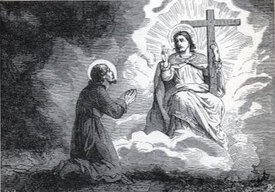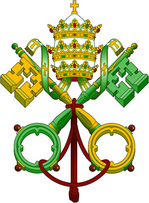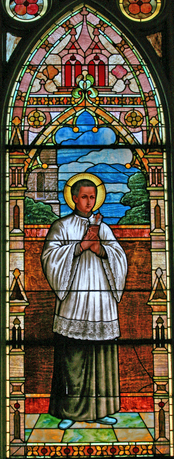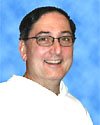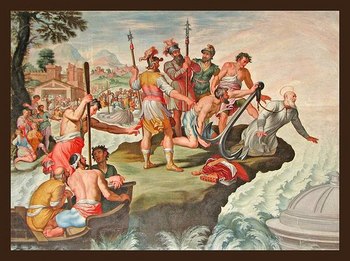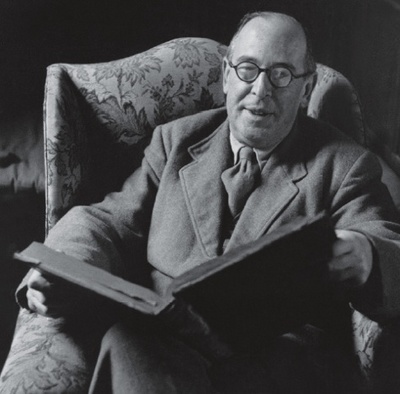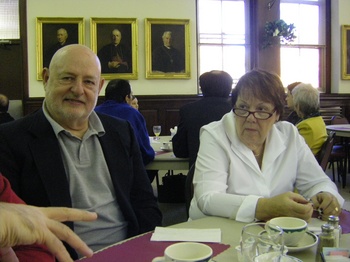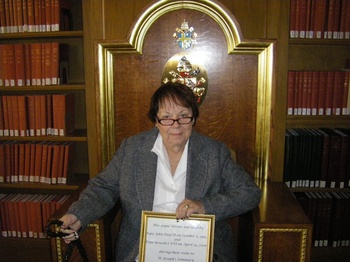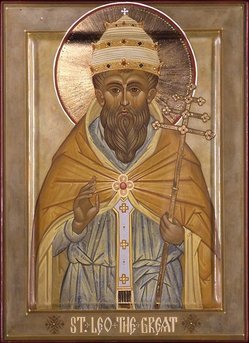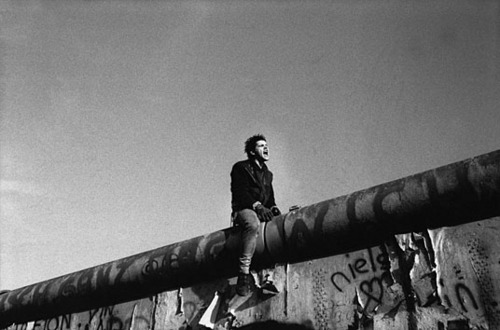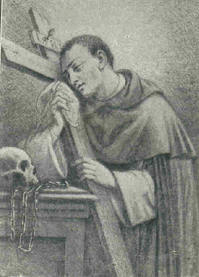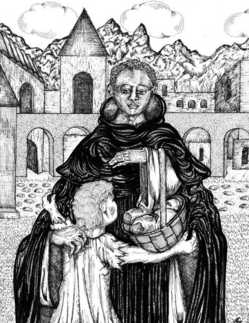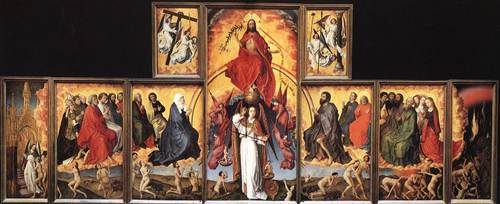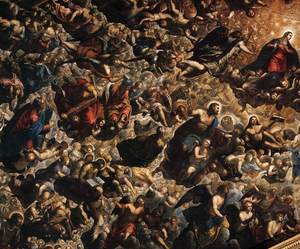November 2009 Archives
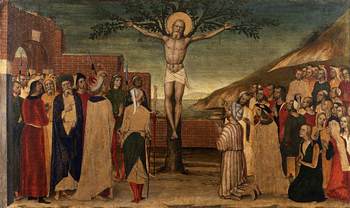 Their sound goes forth to all the earth. And their speech to the end of the world.
Their sound goes forth to all the earth. And their speech to the end of the world.As you know, 21 November 2009 the Holy Father held an audience in Rome with a number of prominent artists, musicians and architects. In support of his efforts, a number of Catholic architects, academics, musicologists, journalists have drafted a letter of appeal to Pope Benedict offering considerations for the recovery the sacred arts in support of the sacred Liturgy.
I have attached the English draft translation for your consideration. This is still in draft form, but is substantially in place. Appeal to His Holiness.pdf
A Congress on Sacred Art in Rome is being planned next year to draw attention to the issue. At present, we are still looking to get the word out, and to enlist signatories of architects, artists, academics, journalists, cultural critics, clergy, concerned laity, and the like to add their support to this endeavor.
Would you please visit the website to become a signatory to this letter, and forward this email to your own circle of influence, and perhaps give it some space where ever you publish or contribute?
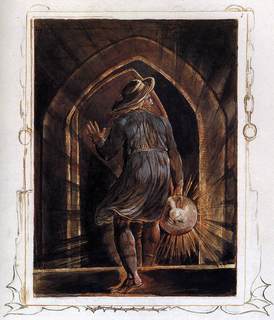 To Thee, O Lord, have I lifted up my soul: in Thee, O my God, I put my trust; let me not be ashamed. Neither let my enemies laugh at me: for none of them that wait on Thee shall be confounded.
To Thee, O Lord, have I lifted up my soul: in Thee, O my God, I put my trust; let me not be ashamed. Neither let my enemies laugh at me: for none of them that wait on Thee shall be confounded.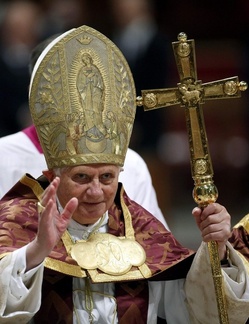
With great joy I welcome you to this solemn place, so rich in art and in history. I cordially greet each and every one of you and I thank you for accepting my invitation. At this gathering I wish to express and renew the Church's friendship with the world of art, a friendship that has been strengthened over time; indeed Christianity from its earliest days has recognized the value of the arts and has made wise use of their varied language to express her unvarying message of salvation. This friendship must be continually promoted and supported so that it may be authentic and fruitful, adapted to different historical periods and attentive to social and cultural variations. Indeed, this is the reason for our meeting here today. I am deeply grateful to Archbishop Gianfranco Ravasi, President of the Pontifical Council for Culture and of the Pontifical Commission for the Cultural Patrimony of the Church, and likewise to his officials, for promoting and organizing this meeting, and I thank him for the words he has just addressed to me. I greet the Cardinals, the Bishops, the priests and the various distinguished personalities present. I also thank the Sistine Chapel Choir for their contribution to this gathering. Today's event is focused on you, dear and illustrious artists, from different countries, cultures and religions, some of you perhaps remote from the practice of religion, but interested nevertheless in maintaining communication with the Catholic Church, in not reducing the horizons of existence to mere material realities, to a reductive and trivializing vision. You represent the varied world of the arts and so, through you, I would like to convey to all artists my invitation to friendship, dialogue and cooperation.
Some significant anniversaries occur around this time. It is ten years since the Letter to Artists by my venerable Predecessor, the Servant of 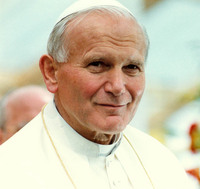 God Pope John Paul II. For the first time, on the eve of the Great Jubilee of the Year 2000, the Pope, who was an artist himself, wrote a Letter to artists, combining the solemnity of a pontifical document with the friendly tone of a conversation among all who, as we read in the initial salutation, "are passionately dedicated to the search for new 'epiphanies' of beauty". Twenty-five years ago the same Pope proclaimed Blessed Fra Angelico the patron of artists, presenting him as a model of perfect harmony between faith and art. I also recall how on
God Pope John Paul II. For the first time, on the eve of the Great Jubilee of the Year 2000, the Pope, who was an artist himself, wrote a Letter to artists, combining the solemnity of a pontifical document with the friendly tone of a conversation among all who, as we read in the initial salutation, "are passionately dedicated to the search for new 'epiphanies' of beauty". Twenty-five years ago the same Pope proclaimed Blessed Fra Angelico the patron of artists, presenting him as a model of perfect harmony between faith and art. I also recall how on 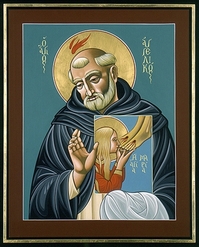 the express wish of Pope Paul VI, to confirm the friendship between the Church and the arts. The words that he spoke on that occasion resound once more today under the vault of the Sistine Chapel and touch our hearts and our minds. "We need you," he said. "We need your collaboration in order to carry out our ministry, which consists, as you know, in preaching and rendering accessible and comprehensible to the minds and hearts of our people the things of the spirit, the invisible, the ineffable, the things of God himself. And in this activity ... you are masters. It is your task, your mission, and your art consists in grasping treasures from the heavenly realm of the spirit and clothing them in words, colours, forms - making them accessible." So great was Paul VI's esteem for artists that he was moved to use daring expressions. "And if we were deprived of your assistance," he added, "our ministry would become faltering and uncertain, and a special effort would be needed, one might say, to make it artistic, even prophetic. In order to scale the heights of lyrical expression of intuitive beauty, priesthood would have to coincide with art." On that occasion Paul VI made a commitment to "re-establish the friendship between the Church and artists", and he invited artists to make a similar, shared commitment, analyzing seriously and objectively the factors that disturbed this relationship, and assuming individual responsibility, courageously and passionately, for a newer and deeper journey in mutual acquaintance and dialogue in order to arrive at an authentic "renaissance" of art in the context of a new humanism.
the express wish of Pope Paul VI, to confirm the friendship between the Church and the arts. The words that he spoke on that occasion resound once more today under the vault of the Sistine Chapel and touch our hearts and our minds. "We need you," he said. "We need your collaboration in order to carry out our ministry, which consists, as you know, in preaching and rendering accessible and comprehensible to the minds and hearts of our people the things of the spirit, the invisible, the ineffable, the things of God himself. And in this activity ... you are masters. It is your task, your mission, and your art consists in grasping treasures from the heavenly realm of the spirit and clothing them in words, colours, forms - making them accessible." So great was Paul VI's esteem for artists that he was moved to use daring expressions. "And if we were deprived of your assistance," he added, "our ministry would become faltering and uncertain, and a special effort would be needed, one might say, to make it artistic, even prophetic. In order to scale the heights of lyrical expression of intuitive beauty, priesthood would have to coincide with art." On that occasion Paul VI made a commitment to "re-establish the friendship between the Church and artists", and he invited artists to make a similar, shared commitment, analyzing seriously and objectively the factors that disturbed this relationship, and assuming individual responsibility, courageously and passionately, for a newer and deeper journey in mutual acquaintance and dialogue in order to arrive at an authentic "renaissance" of art in the context of a new humanism.
That historic encounter, as I mentioned, took place here in this sanctuary of faith and human creativity. So it is not by chance that we come together in this place, esteemed for its architecture and its symbolism, and above all for the frescoes that make it unique, from the masterpieces of Perugino and Botticelli, Ghirlandaio and Cosimo Rosselli, Luca Signorelli and others, to the Genesis scenes and the Last Judgement of Michelangelo Buonarroti, who has given us here one of the most extraordinary creations in the entire history of art. The universal language of music has often been heard here, thanks to the genius of great musicians who have placed their art at the service of the liturgy, assisting the spirit in its ascent towards God. At the same time, the Sistine Chapel is remarkably vibrant with history, since it is the solemn and austere setting of events that mark the history of the Church and of mankind. Here as you know, the College of Cardinals elects the Pope; here it was that I myself, with trepidation but also with absolute trust in the Lord, experienced the privileged moment of my election as Successor of the Apostle Peter.
Dear friends, let us allow these frescoes to speak to us today, drawing us towards the ultimate goal of human history. The Last Judgement, which you see behind me, reminds us that human history is movement and ascent, a continuing tension towards fullness, towards human happiness, towards a horizon that always transcends the present moment even as the two coincide. Yet the dramatic scene portrayed in this fresco also places before our eyes the risk of man's definitive fall, a risk that threatens to engulf him whenever he allows himself to be led astray by the forces of evil. So the fresco issues a strong prophetic cry against evil, against every form of injustice. For believers, though, the Risen Christ is the Way, the Truth and the Life. For his faithful followers, he is the Door through which we are brought to that "face-to-face" vision of God from which limitless, full and definitive happiness flows. Thus Michelangelo presents to our gaze the Alpha and the Omega, the Beginning and the End of history, and he invites us to walk the path of life with joy, courage and hope. The dramatic beauty of Michelangelo's painting, its colours and forms, becomes a proclamation of hope, an invitation to raise our gaze to the ultimate horizon. The profound bond between beauty and hope was the essential content of the evocative 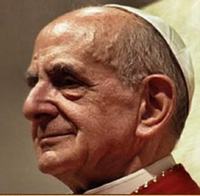 Message that Paul VI addressed to artists at the conclusion of the Second Vatican Ecumenical Council on 8 December 1965: "To all of you," he proclaimed solemnly, "the Church of the Council declares through our lips: if you are friends of true art, you are our friends!" And he added: "This world in which we live needs beauty in order not to sink into despair. Beauty, like truth, brings joy to the human heart, and is that precious fruit which resists the erosion of time, which unites generations and enables them to be one in admiration. And all this through the work of your hands . . . Remember that you are the custodians of beauty in the world."
Message that Paul VI addressed to artists at the conclusion of the Second Vatican Ecumenical Council on 8 December 1965: "To all of you," he proclaimed solemnly, "the Church of the Council declares through our lips: if you are friends of true art, you are our friends!" And he added: "This world in which we live needs beauty in order not to sink into despair. Beauty, like truth, brings joy to the human heart, and is that precious fruit which resists the erosion of time, which unites generations and enables them to be one in admiration. And all this through the work of your hands . . . Remember that you are the custodians of beauty in the world."
Unfortunately, the present time is marked, not only by negative elements in the social and economic sphere, but also by a weakening of hope, by a certain lack of confidence in human relationships, which gives rise to increasing signs of resignation, aggression and despair. The world in which we live runs the risk of being altered beyond recognition because of unwise human actions which, instead of cultivating its beauty, unscrupulously exploit its resources for the advantage of a few and not infrequently disfigure the marvels of nature. What is capable of restoring enthusiasm and confidence, what can encourage the human spirit to rediscover its path, to raise its eyes to the horizon, to dream of a life worthy of its vocation - if not beauty? Dear friends, as artists you know well that the experience of beauty, beauty that is authentic, not merely transient or artificial, is by no means a supplementary or secondary factor in our search for meaning and happiness; the experience of beauty does not remove us from reality, on the contrary, it leads to a direct encounter with the daily reality of our lives, liberating it from darkness, transfiguring it, making it radiant and beautiful.
Indeed, an essential function of genuine beauty, as emphasized by Plato, is that it gives man a healthy "shock", it draws him out of himself, wrenches him away from resignation and from being content with the humdrum - it even makes him suffer, piercing him like a dart, but in so doing it "reawakens" him, opening afresh the eyes of his heart and mind, giving him wings, carrying him aloft. Dostoevsky's words that I am about to quote are bold and paradoxical, but they invite reflection. He says this: "Man can live without science, he can live without bread, but without beauty he could no longer live, because there would no longer be anything to do to the world. The whole secret is here, the whole of history is here." The painter Georges Braque echoes this sentiment: "Art is meant to disturb, science reassures." Beauty pulls us up short, but in so doing it reminds us of our final destiny, it sets us back on our path, fills us with new hope, gives us the courage to live to the full the unique gift of life. The quest for beauty that I am describing here is clearly not about escaping into the irrational or into mere aestheticism.
Too often, though, the beauty that is thrust upon us is illusory and deceitful, superficial and blinding, leaving the onlooker dazed; instead of bringing him out of himself and opening him up to horizons of true freedom as it draws him aloft, it imprisons him within himself and further enslaves him, depriving him of hope and joy. It is a seductive but hypocritical beauty that rekindles desire, the will to power, to possess, and to dominate others, it is a beauty which soon turns into its opposite, taking on the guise of indecency, transgression or gratuitous provocation. Authentic beauty, however, unlocks the yearning of the human heart, the profound desire to know, to love, to go towards the Other, to reach for the Beyond. If we acknowledge that beauty touches us intimately, that it wounds us, that it opens our eyes, then we rediscover the joy of seeing, of being able to grasp the profound meaning of our existence, the Mystery of which we are part; from this Mystery we can draw fullness, happiness, the passion to engage with it every day. In this regard, Pope John Paul II, in his Letter to Artists, quotes the following verse from a Polish poet, Cyprian Norwid: "Beauty is to enthuse us for work, and work is to raise us up" (no. 3). And later he adds: "In so far as it seeks the beautiful, fruit of an imagination which rises above the everyday, art is by its nature a kind of appeal to the mystery. Even when they explore the darkest depths of the soul or the most unsettling aspects of evil, the artist gives voice in a way to the universal desire for redemption" (no. 10). And in conclusion he states: "Beauty is a key to the mystery and a call to transcendence" (no. 16).
These ideas impel us to take a further step in our reflection. Beauty, whether that of the natural universe or that expressed in art, precisely because it opens up and broadens the horizons of human awareness, pointing us beyond ourselves, bringing us face to face with the abyss of Infinity, can become a path towards the transcendent, towards the ultimate Mystery, towards God. Art, in all its forms, at the point where it encounters the great questions of our existence, the fundamental themes that give life its meaning, can take on a religious quality, thereby turning into a path of profound inner reflection and spirituality. This close proximity, this harmony between the journey of faith and the artist's path is attested by countless artworks that are based upon the personalities, the stories, the symbols of that immense deposit of "figures" - in the broad sense - namely the Bible, the Sacred Scriptures. The great biblical narratives, themes, images and parables have inspired innumerable masterpieces in every sector of the arts, just as they have spoken to the hearts of believers in every generation through the works of craftsmanship and folk art, that are no less eloquent and evocative.
In this regard, one may speak of a via pulchritudinis, a path of beauty which is at the same time an artistic and aesthetic journey, a journey of faith, of theological enquiry. The theologian Hans Urs von Balthasar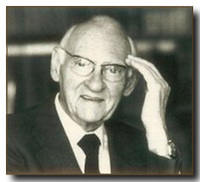 begins his great work entitled The Glory of the Lord - a Theological Aesthetics with these telling observations: "Beauty is the word with which we shall begin. Beauty is the last word that the thinking intellect dares to speak, because it simply forms a halo, an untouchable crown around the double constellation of the true and the good and their inseparable relation to one another." He then adds: "Beauty is the disinterested one, without which the ancient world refused to understand itself, a word which both imperceptibly and yet unmistakably has bid farewell to our new world, a world of interests, leaving it to its own avarice and sadness. It is no longer loved or fostered even by religion." And he concludes: "We can be sure that whoever sneers at her name as if she were the ornament of a bourgeois past - whether he admits it or not - can no longer pray and soon will no longer be able to love." The way of beauty leads us, then, to grasp the Whole in the fragment, the Infinite in the finite, God in the history of humanity.
begins his great work entitled The Glory of the Lord - a Theological Aesthetics with these telling observations: "Beauty is the word with which we shall begin. Beauty is the last word that the thinking intellect dares to speak, because it simply forms a halo, an untouchable crown around the double constellation of the true and the good and their inseparable relation to one another." He then adds: "Beauty is the disinterested one, without which the ancient world refused to understand itself, a word which both imperceptibly and yet unmistakably has bid farewell to our new world, a world of interests, leaving it to its own avarice and sadness. It is no longer loved or fostered even by religion." And he concludes: "We can be sure that whoever sneers at her name as if she were the ornament of a bourgeois past - whether he admits it or not - can no longer pray and soon will no longer be able to love." The way of beauty leads us, then, to grasp the Whole in the fragment, the Infinite in the finite, God in the history of humanity.  Simone Weil wrote in this regard: "In all that awakens within us the pure and authentic sentiment of beauty, there, truly, is the presence of God. There is a kind of incarnation of God in the world, of which beauty is the sign. Beauty is the experimental proof that incarnation is possible. For this reason all art of the first order is, by its nature, religious." Hermann Hesse makes the point even more graphically: "Art means: revealing God in everything that exists." Echoing the words of Pope Paul VI, the Servant of God Pope John Paul II restated the Church's desire to renew dialogue and cooperation with artists: "In order to communicate the message entrusted to her by Christ, the Church needs art" (no. 12); but he immediately went on to ask: "Does art need the Church?" - thereby inviting artists to rediscover a source of fresh and well-founded inspiration in religious experience, in Christian revelation and in the "great codex" that is the Bible.
Simone Weil wrote in this regard: "In all that awakens within us the pure and authentic sentiment of beauty, there, truly, is the presence of God. There is a kind of incarnation of God in the world, of which beauty is the sign. Beauty is the experimental proof that incarnation is possible. For this reason all art of the first order is, by its nature, religious." Hermann Hesse makes the point even more graphically: "Art means: revealing God in everything that exists." Echoing the words of Pope Paul VI, the Servant of God Pope John Paul II restated the Church's desire to renew dialogue and cooperation with artists: "In order to communicate the message entrusted to her by Christ, the Church needs art" (no. 12); but he immediately went on to ask: "Does art need the Church?" - thereby inviting artists to rediscover a source of fresh and well-founded inspiration in religious experience, in Christian revelation and in the "great codex" that is the Bible.
Dear artists, as I draw to a conclusion, I too would like to make a cordial, friendly and impassioned appeal to you, as did my Predecessor. You are the custodians of beauty: thanks to your talent, you have the opportunity to speak to the heart of humanity, to touch individual and collective sensibilities, to call forth dreams and hopes, to broaden the horizons of knowledge and of human engagement. Be grateful, then, for the gifts you have received and be fully conscious of your great responsibility to communicate beauty, to communicate in and through beauty! Through your art, you yourselves are to be heralds and witnesses of hope for humanity! And do not be afraid to approach the first and last source of beauty, to enter into dialogue with believers, with those who, like yourselves, consider that they are pilgrims in this world and in history towards infinite Beauty! Faith takes nothing away from your genius or your art: on the contrary, it exalts them and nourishes them, it encourages them to cross the threshold and to contemplate with fascination and emotion the ultimate and definitive goal, the sun that does not set, the sun that illumines this present moment and makes it beautiful.
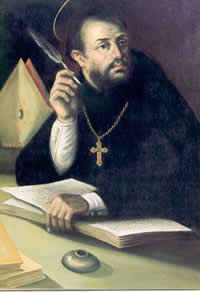 Saint Augustine, who fell in love with beauty and sang its praises, wrote these words as he reflected on man's ultimate destiny, commenting almost ante litteram on the Judgement scene before your eyes today: "Therefore we are to see a certain vision, my brethren, that no eye has seen, nor ear heard, nor the heart of man conceived: a vision surpassing all earthly beauty, whether it be that of gold and silver, woods and fields, sea and sky, sun and moon, or stars and angels. The reason is this: it is the source of all other beauty" (In 1 Ioannis, 4:5). My wish for all of you, dear artists, is that you may carry this vision in your eyes, in your hands, and in your heart, that it may bring you joy and continue to inspire your fine works. From my heart I bless you and, like Paul VI, I greet you with a single word: arrivederci!
Saint Augustine, who fell in love with beauty and sang its praises, wrote these words as he reflected on man's ultimate destiny, commenting almost ante litteram on the Judgement scene before your eyes today: "Therefore we are to see a certain vision, my brethren, that no eye has seen, nor ear heard, nor the heart of man conceived: a vision surpassing all earthly beauty, whether it be that of gold and silver, woods and fields, sea and sky, sun and moon, or stars and angels. The reason is this: it is the source of all other beauty" (In 1 Ioannis, 4:5). My wish for all of you, dear artists, is that you may carry this vision in your eyes, in your hands, and in your heart, that it may bring you joy and continue to inspire your fine works. From my heart I bless you and, like Paul VI, I greet you with a single word: arrivederci!
Je suis heureux de saluer tous les artistes présents. Chers amis, je vous encourage à découvrir et à exprimer toujours mieux, à travers la beauté de vos œuvres, le mystère de Dieu et le mystère de l'homme. Que Dieu vous bénisse!
Dear friends, thank you for your presence here today. Let the beauty that you express by your God-given talents always direct the hearts of others to glorify the Creator, the source of all that is good. God's blessings upon you all!
Sehr herzlich grüβe ich euch, liebe Freunde. Mit eurem künstlerischen Talent macht ihr gleichsam das Schöpferwirken Gottes sichtbar. Der Herr, der uns im Schönen nah sein will, erfülle euch mit seinem Geist der Liebe. Gott segne euch alle.
Saludo cordialmente a los artistas que participan en este encuentro. Queridos amigos, os animo a fomentar el sentido y las manifestaciones de la hermosura en la creación. Que Dios os bendiga. Muchas gracias.
Sistine Chapel
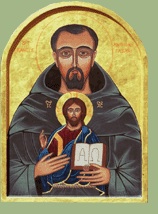 The teaching of truth was in his mouth, and no wrong was found on his lips; he walked with me in peace and justice and turned many away from wickedness.
The teaching of truth was in his mouth, and no wrong was found on his lips; he walked with me in peace and justice and turned many away from wickedness.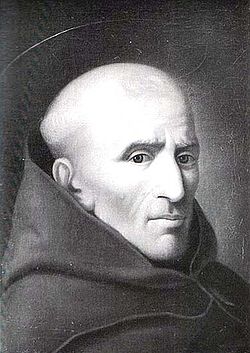
I just finished reading Bishop Arthur Serratelli's address to the 2009 National Meeting of Diocesan Liturgical Commissions which met in October in Michigan. As you may know, Bishop Serratelli is the Bishop of Paterson (NJ) and chairman of the Bishops' Committee on Divine Worship. The Bishop's address is clear, catechetical and perfect for recalling the central reasons of our worship of God. I recommend it for clergy, DREs and laity alike. Read the address here: CDW News Sept.Oct 2009.pdf
This article appeared in the 18 November 2009 issue of L'Osservatore Romano (weekly English edition). Thought it would do us well to consider one or two of the author's points.
Even before the Holy Father had provided a title for the recently-published Apostolic Constitution, Anglicanorum Coetibus, providing for Personal Ordinariates for Anglicans entering into full communion with the See of Peter, many anticipated the numerous ways in which the incorporation of these new members would be beneficial to the Church.
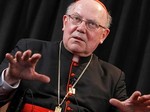 Cardinal Levada remarked: "It is the hope of the Holy Father, Pope Benedict XVI, that the Anglican clergy and faithful who desire union with the Catholic Church will find in this canonical structure the opportunity to preserve those Anglican traditions precious to them and consistent with the Catholic faith. Insofar as these traditions express in a distinctive way the faith that is held in common, they are a gift to be shared in the wider Church."
Cardinal Levada remarked: "It is the hope of the Holy Father, Pope Benedict XVI, that the Anglican clergy and faithful who desire union with the Catholic Church will find in this canonical structure the opportunity to preserve those Anglican traditions precious to them and consistent with the Catholic faith. Insofar as these traditions express in a distinctive way the faith that is held in common, they are a gift to be shared in the wider Church."
One might well wonder what concrete form a sharing of those gifts with the wider Church could assume. Whereas it would be proleptic to attempt to catalogue the many and diverse blessing the arrival of these anticipated new members will bring to the Church, one thing is certain. Even the most "high church" among them will have been sufficiently influenced by the Protestant sensibilities of Anglicanism to bring with them a great reverence and a high standard for liturgical preaching. A profound attentiveness to biblical preaching is the undeniable patrimony in all of its forms, including Anglicanism, despite the ambiguity some of its members may experience over identifying themselves as Protestant.
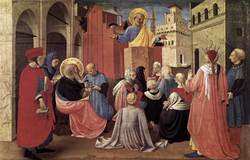 If anything, the Anglican Communion has been noted for its wide diversity. Accordingly, many Anglicans who might have answered to such labels as "high church" or "Anglo-Catholic," could have been observed maintaining patterns of weekly (and even mid-weekly) Eucharist while simultaneously, so-called evangelical or "low-church" Anglicans might have typically attended non-eucharistic Morning Prayer most Sundays." Broad" Anglicans would feel at home at any number of points between those two extremes.
If anything, the Anglican Communion has been noted for its wide diversity. Accordingly, many Anglicans who might have answered to such labels as "high church" or "Anglo-Catholic," could have been observed maintaining patterns of weekly (and even mid-weekly) Eucharist while simultaneously, so-called evangelical or "low-church" Anglicans might have typically attended non-eucharistic Morning Prayer most Sundays." Broad" Anglicans would feel at home at any number of points between those two extremes.
One value shared in common among all Anglicans, however, has been their expectation of regular and good preaching. It can be reasonably well anticipated that most Anglicans who will take advantage of the accommodations extended in the Holy Father's Apostolic Constitution will come from the ranks of the high churchmen, and to their love for preaching it is reasonable to add the expectation that the preaching will be theological, eloquent and sophisticated. The presence of this expectation in a great number of new Catholics is good news for the Church, since this strengthen the expectation placed upon priests to enhance the quality of their proclamation of the Word. Of course, former Anglican priests who become Catholic priests will bring their refined homiletic patterns with them.
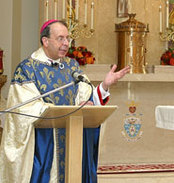 The renewal of preaching is perhaps of the most highly successful and least neuralgic of all the liturgical initiatives of Vatican II. After some decades of ambiguity, at least at the popular level, about the role of preaching in the liturgy, Sacrosanctum Concilium clarified that preaching is part of the liturgy itself (art. 52) and from that moment, a homiletic renewal unfolded. With little, if any resistance, preaching at the Mass (even at daily Mass), at the celebration of the Sacraments, at the Liturgy of the Hours and at numerous paraliturgical events has become normative and increasingly better quality. Seminaries around the world began paying better attention to the homiletic formation of seminarians, and on-going formation programs for priests are repeatedly asked to sponsor preaching workshops in their curricula.
The renewal of preaching is perhaps of the most highly successful and least neuralgic of all the liturgical initiatives of Vatican II. After some decades of ambiguity, at least at the popular level, about the role of preaching in the liturgy, Sacrosanctum Concilium clarified that preaching is part of the liturgy itself (art. 52) and from that moment, a homiletic renewal unfolded. With little, if any resistance, preaching at the Mass (even at daily Mass), at the celebration of the Sacraments, at the Liturgy of the Hours and at numerous paraliturgical events has become normative and increasingly better quality. Seminaries around the world began paying better attention to the homiletic formation of seminarians, and on-going formation programs for priests are repeatedly asked to sponsor preaching workshops in their curricula.
There will undoubtedly be moments of joy as well as suffering as the presence of the former Anglicans entering the Church under conditions of Anglicanorum Coetibus begins to be felt. That joy and the suffering will be sustained by veteran and new Catholics alike. Much uncertainty lies in the near future. What is certain however, is that the former Anglicans' heritage of good preaching and their expectation that this will be continued will only serve the Church well as these new expectations strengthen the impetus to the charge the Church has already embraced to refine and strengthen its ministry of the Word.
All of the pieces are in place for a win-win situation. Moreover, this expectation is quite realistic, since in Cardinal Newman we will recall that precedent has already been set.
Michael Monshau, O.P., professor of Liturgy, Homiletics and Spirituality at the Pontifical University of Saint Thomas Aquinas (The Angelicum) in
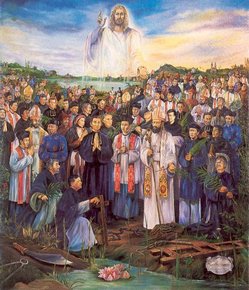 "Fear not those who kill the body;
"Fear not those who kill the body;Rather those who steal the soul;
On your head, each hair is numbered.
God himself will keep you whole."
We give thanks for Andrew Dung-Lac,
Faithful priest, and for his friends,
Raised by God to preach and nurture
Vietnam to Christian ends.
When the days of persecution
Overtook the Church, they stood
Firm in faith against oppression,
Boasting in the cross's good.
Father, Son, and Holy Spirit,
Three-in-One, our God and Lord,
From your church, with all your martyrs,
You are worshiped and adored.
J. Michael Thompson
Copyright © 2009, World Library Publications
87 87 STUTTGART
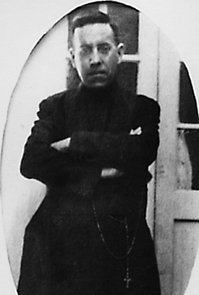
He is King of hearts, too, by reason of his "charity
which exceedeth all knowledge." And his mercy and kindness which draw
all
men to him, for never has it been known, nor will it ever be, that man be loved
so much and so universally as Jesus Christ.
-Pope Pius XI, December 11, 1925,
Qua Primas
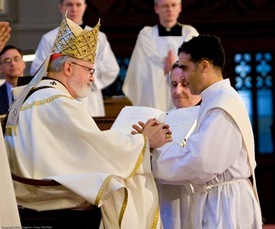
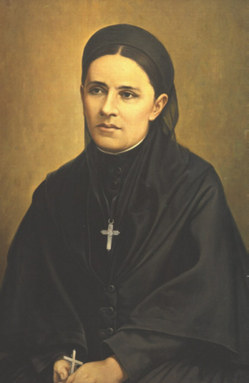 Come bride of Christ, and receive the crown, which the Lord has prepared for you for ever.
Come bride of Christ, and receive the crown, which the Lord has prepared for you for ever.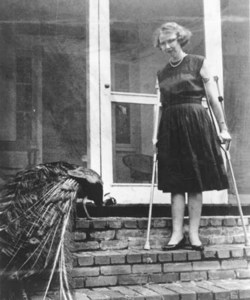 Encountering the grace through the literature is a sufficient way of knowing Christ and the fruitfulness of the Gospel. For many, myself included, Mary Flannery O'Connor is wonderful entree into the Mystery of God. Watch the story, I think you'd surprised by what you'd learn.
Encountering the grace through the literature is a sufficient way of knowing Christ and the fruitfulness of the Gospel. For many, myself included, Mary Flannery O'Connor is wonderful entree into the Mystery of God. Watch the story, I think you'd surprised by what you'd learn.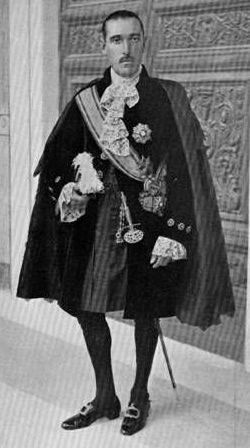 Bet you didn't know the Church had black nobility. Do you know the difference between the white and the black nobility? Not many good Catholics can anymore. AND certainly not many on this side of the pond. For most Americans the idea of nobility is foolish. Especially given our history of rejecting the monarchy. American interest in things monarchical is kept to a quiet interest in Britain's queen and perhaps to one or two other royal personages of northern Europe. And if you watch 60 Minutes you'd be familiar with the Sultan in Bahrain.
Bet you didn't know the Church had black nobility. Do you know the difference between the white and the black nobility? Not many good Catholics can anymore. AND certainly not many on this side of the pond. For most Americans the idea of nobility is foolish. Especially given our history of rejecting the monarchy. American interest in things monarchical is kept to a quiet interest in Britain's queen and perhaps to one or two other royal personages of northern Europe. And if you watch 60 Minutes you'd be familiar with the Sultan in Bahrain.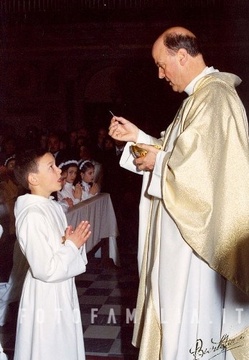
The Catholic News Agency ran this brief article yesterday (11/19/2009). It captured my mind and heart, like it did for others, because I know two people with Lou Gehrig's disease (and one is also a priest) and another priest who's living with MS. The courage, love and patience these men have witnessed is incredible. At least I think so.
Father Luigi Squarcia, a pastor in the Italian town of Acquapendente who has suffered from Lou Gehrig's disease for the last four years, met with Pope Benedict XVI on Wednesday and offered his "sufferings for the good of the Church."
After the meeting with the Holy Father in Paul VI Hall, Father Squarcia said, "I came to offer the Pope my sufferings for the good of the Church. I am here, for the first time, after years of working with the parishioners and the children at our school."
Now, he told L'Osservatore Romano, "I can no longer move my arms or legs and I know I will lose my speech and later maybe the ability to breathe." He noted that more people than ever are coming to him for the Sacrament of Reconciliation.
Lou Gehrig's disease is a serious neuromuscular disorder that causes muscle weakness, disability and eventually death.
*Father Luigi in a 2004 photo.
If you want a keener sense of what Father Luigi is speaking of when he says I am came offer my sufferings for the Church, then I would suggest you read Pope John Paul II's 1984 encyclical, Salvifici Doloris, where he deals with notions of suffering and how it can be redemptive. That is, how suffering can be useful for the salvation of the work if we unite our suffering to that of Christ's. Putting suffering to good use otherwise it will eat you alive and deaden you affectively and spiritually. If not redemptive then it's all-consuming and verging on nihilistic.

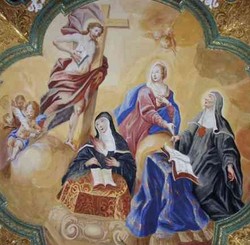
"Then shall I leap into love"
I cannot dance, Lord, unless you lead me.
If you want me to leap with abandon,
You must intone the song.
Then I shall leap into love, From love into knowledge,
From knowledge into enjoyment,
And from enjoyment beyond all human sensations.
There I want to remain, yet want also to circle higher still.
According to some scholars, this Cistercian-Benedictine nun and poet, theologian and mystic was the inspiration of Dante's Divine Comedy. Interesting that her liturgical memorial comes at the end of the liturgical calendar given her visions of heaven, hell and purgatory! Some people register a doubt about her status as a canonized saint in the Church but she is remembered in the Roman Martyrology (2004) and venerated as such by many, including the Cistercian-Benedictines and that's good enough for me. The Martyrology speaks of Saint Mechtild as a woman of exquiste doctrine and humility, and supernatural gifts of mystical contemplation.
The prayer for Saint Mechtild may be found here and her biography here.
From a recent Zenit news article, I learned something that I never knew before: "It is estimated that there are 1.3 million deaf Catholics, and the Vatican is intent on ensuring that they can fully participate in the Church." Archbishop Zygmunt Zimowski, president of the Pontifical Council for Health Care Ministry, gave this statistic at his department's 24th international conference meeting this week in Rome. The conference's theme is "Ephphata: the Deaf Person in the Life of the Church."
"The prelate," according to Zenit said, "estimated that in developed countries, one child out of 1,000 is deaf, but the problem is more serious in poor countries, where 80% of the world's deaf live. In these cases, deafness is often the result of insufficient medical care and lack of medication." He indicated "the need to help people with this impairment, precisely as 'the world has begun to overcome the prejudices and superstitions linked to physical disability.'"
A liturgical resource for helping the deaf is Joan Blake's Signing the Scriptures:
Plus, there's the DVD Tips and Techniques for Signing the Scriptures.

"Go forth to the world and proclaim the Good News!"
Thus sent forth, the Church has, with no time to lose,
Sent missioners brave to the ends of the earth,
That souls thralled in darkness may come to new birth.
With charity filled and heart burning with zeal,
Saint Rose sought to serve God, and sent her appeal,
Which brought her companions who caught her delight
And went to Missouri to spread Jesus' light.
In hardship and hunger, she forged on with strength;
For girls' education, she struggled at length.
And then, when her work and her harvest was nigh,
She turned to the missions for natives nearby.
O praise God the Father, O praise God the Son,
And praise God the Spirit, the great Three-in-One.
We ask through Saint Rose for strong faith, hope, and love,
As we praise the One who is reigning above.
BALTIMORE (CNS) -- The U.S. bishops approved the English translation and U.S. adaptations of five final sections of the Roman Missal in voting on the second day of their annual fall general assembly in Baltimore. With overwhelming majority votes, the bishops approved translations of the proper of the saints, specific prayers to each saint in the universal liturgical calendar; the commons, general prayers for celebrating saints listed in the "Roman Martyrology"; the Roman Missal supplement; the U.S. propers, a collection of orations and formularies for feasts and memorials particular to the U.S. liturgical calendar; and U.S. adaptations to the Roman Missal. There was some debate on the floor about a separate piece of the translations -- the antiphons -- which has not come to the bishops for consideration, but instead has advanced through the Vatican's approval procedures without the consultation of the English-language bishops' conferences around the world. But the final five sections of the missal before the bishops passed with minimal discussion and only a handful of proposed amendments to the texts. The Vatican's Congregation for Divine Worship now must grant its "recognitio," or approval, to allow the translations to proceed.
Read Father John Zuhlsdorf's perspective on the liturgical translation
issue passed today. As Father Z said, it's over!
As you are aware, the Pope is assisted by various departments as pastor of the Church. Without naming all of them, the significant ones are Faith, Worship, Saints, Clergy and Evangelization. The latter department is headed by the Indian cardinal, Ivan Dias. As "Prefect of the Congregation for the Evangelization of Peoples" he works with the world's bishops and other competent folk in sharing the Good News. Each year all the departments meet with the full body of members and experts to deal with the significant issues identified by the Pope and the Cardinal. In the case of this address, one can't help thinking of the work of the of new lay movements in the Church and some of the new religious orders doing the hard work of being in the marketplace. I for one, can't help remember the Pope's address to the Benedictine Oblates of St Frances of Rome where he praised them for keeping a religious life with a particular focus of being in the center of the city as a witness to Christ while helping the poor.
What follows is the Pope's address to the plenary session of Congregation for the Evangelization of Peoples. Note the points emphasized.
On the occasion of the plenary assembly of the Congregation
for the Evangelization of Peoples, I wish to express to you, Lord Cardinal, my
cordial greeting, which I happily extend to the archbishops, bishops and all
those taking part in this assembly. I also greet the secretary, the assistant
secretary, the under-secretary and all the collaborators of this dicastery. I
add the expression of my sentiments of appreciation and gratitude for the service
you render the Church in the area of the mission ad gentes [to the peoples].
The topic you are addressing in this meeting, "St. Paul and the New Areopagi" -- also in light of the Pauline Year concluded a short while ago -- assists in reliving an experience of the Apostle to the Gentiles while in Athens. After having preached in many places, he addressed the Areopagus and there proclaimed the Gospel using a language that today we could describe as "inculturated" (cf. Acts 17:22-31).
That Areopagus, which at the time represented the center of culture for the refined Athenian people, today -- as my venerated predecessor John Paul II would say -- "can be taken as a symbol of the new sectors in which the Gospel must be proclaimed" (Redemptoris Missio, 37). In fact, the reference to that event is an urgent invitation to know how to value the "Areopagi" of today, where the great challenges of evangelization are addressed.
You wish to analyze this topic with realism, taking into account the many social changes that have occurred: a realism supported by the spirit of faith, which sees history in the light of the Gospel, and with the certainty that Paul had of the presence of the Risen Christ. Resonating and comforting for us also are the words that Jesus addressed to him in Corinth: "Do not be afraid. Go on speaking, and do not be silent, for I am with you. No one will attack and harm you," (Acts 18:9-10).
In an effective way, the Servant of God Paul VI said that it
is not just a question of preaching the Gospel, but of "affecting and as
it were upsetting, through the power of the Gospel, mankind's criteria of
judgment, determining values, points of interest, lines of thought, sources of
inspiration and models of life, which are in contrast with the Word of God and
the plan of salvation" (Insegnamenti XIII, [1975], 1448).
It is necessary to look at the "new Areopagi" with this spirit; some of these [areas], with present globalization, have become common, whereas others continue to be specific to certain continents, as was seen recently in the special assembly for Africa of the synod of bishops. Therefore, the missionary activity of the Church must be directed to the vital centers of the society of the third millennium.
Not to be underestimated is the influence of a widespread relativistic culture, more often than not lacking in values, which enters the sanctuary of the family, infiltrates the realm of education and other realms of society and contaminates them, manipulating consciences, especially those of the young. At the same time, however, despite these snares, the Church knows that the Holy Spirit is always acting. New doors, in fact, are opened to the Gospel, and spreading in the world is the longing for authentic spiritual and apostolic renewal. As in other periods of change, the pastoral priority is to show the true face of Christ, lord of history and sole redeemer of man.
This demands that every Christian community and the Church as a whole offer a testimony of fidelity to Christ, patiently building that unity desired by him and invoked by all his disciples. The unity of Christians will, in fact, facilitate evangelization and confrontation with the cultural, social and religious challenges of our time.
In this missionary enterprise we can look to the Apostle Paul, imitate his "style" of life and his apostolic "spirit" itself, centered totally on Christ. With this complete adherence to the Lord, Christians will more easily be able to transmit to future generations the heritage of faith, capable of transforming difficulties into possibilities of evangelization.
In the recent encyclical Caritas in Veritate, I
wished to emphasize that the economic and social development of contemporary
society needs to renew attention to the spiritual life and "a serious
consideration of the experiences of trust in God, spiritual fellowship in
Christ, reliance upon God's providence and mercy, love and forgiveness,
self-denial, acceptance of others, justice and peace. Christians long for the
entire human family to call upon God as 'Our Father!'" (No. 79).
Lord Cardinal, while thanking you for the service that this dicastery renders to the cause of the Gospel, I invoke upon you and upon all those taking part in the present plenary assembly the help of God and the protection of the Virgin Mary, star of evangelization, while I send my heartfelt apostolic blessing to all.
From the Vatican, November 13, 2009
BENEDICTUS XVI PP
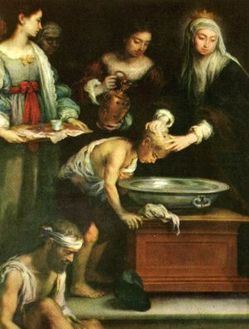
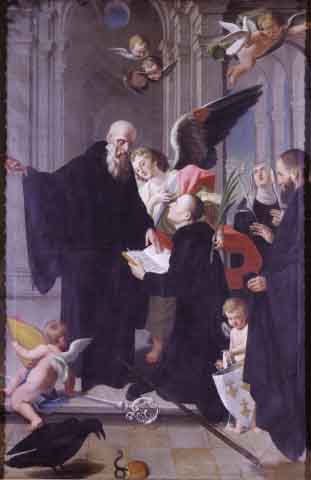 The monks of Saint Benedict's Abbey have put on their
website Father Boniface Verheyen's translation of the Rule of Saint Benedict. The monks at this Abbey have a terrific college and get a steady stream of vocations. This year they have 7 novices: three for Kansas and four for Brazil.
The monks of Saint Benedict's Abbey have put on their
website Father Boniface Verheyen's translation of the Rule of Saint Benedict. The monks at this Abbey have a terrific college and get a steady stream of vocations. This year they have 7 novices: three for Kansas and four for Brazil.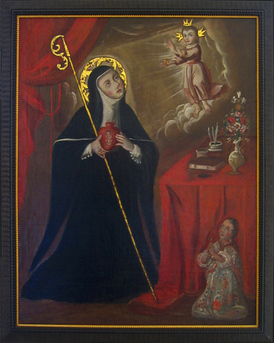 O Lord, You loved to dwell in the pure heart of Your virgin Gertrude. Through her merits and prayers please wash away the stains from our hearts so that they, too, may become worthy dwelling places for Your divine Majesty.
O Lord, You loved to dwell in the pure heart of Your virgin Gertrude. Through her merits and prayers please wash away the stains from our hearts so that they, too, may become worthy dwelling places for Your divine Majesty.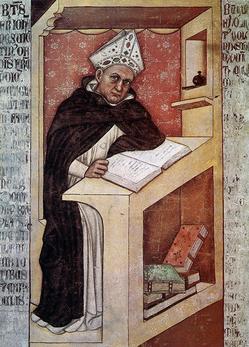
The learned will shine like the brilliance of the firmament, and those who train many in the ways of justice will sparkle like the stars for all eternity.
God of truth, you endowed our brother Albert with the gift of combining human wisdom with divine faith. May the pursuit of all human knowledge lead to a greater knowledge and love of you.
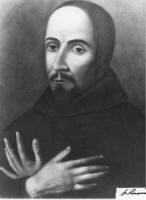 The salvation of the just comes from the Lord. He is their strength in time of need.
The salvation of the just comes from the Lord. He is their strength in time of need.Loving God, you made Blessed John illustrious by a complete self-denial and the utmost zeal for charity that he might reveal the mystery of your love to the poor. By following his example may we seek to please you and aid our brothers and sisters in Christ.


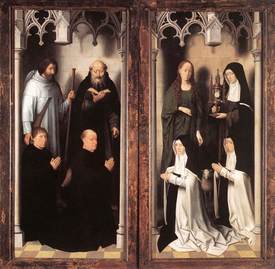
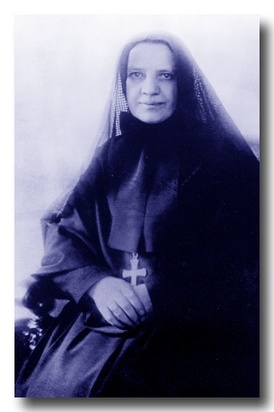
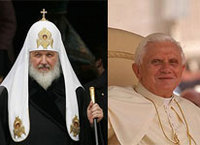 Do you read the Interfax news agency from Moscow. Every now-and-again you should just to keep up with news not seemingly connected with own. Today, Interfax is reporting that Archbishop Hilarion has indicated that a meeting between Russian Orthodox Patriarch Kyrill and Pope Benedict XVI is on the table. No definite plans appear to have been made but there seem to be significant discussions pointing to a meeting. Interesting that this announcement is on the liturgical memorial of Saint Josaphat, brutally martyred by the Ordthodx (on the Latin calendar).
Do you read the Interfax news agency from Moscow. Every now-and-again you should just to keep up with news not seemingly connected with own. Today, Interfax is reporting that Archbishop Hilarion has indicated that a meeting between Russian Orthodox Patriarch Kyrill and Pope Benedict XVI is on the table. No definite plans appear to have been made but there seem to be significant discussions pointing to a meeting. Interesting that this announcement is on the liturgical memorial of Saint Josaphat, brutally martyred by the Ordthodx (on the Latin calendar).
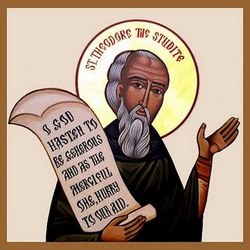
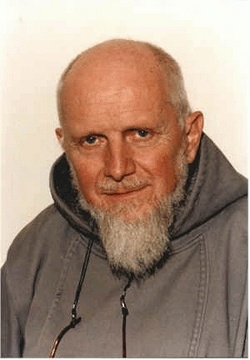
 Today is dedicated to world peace through the recognition of our countrymen's service in the armed forces. We indeed pray for peace of mind and heart, city, state and country. We pray in thanksgiving for the sacrifices of the men and women who served the country to keep us free, safe and peaceful.
Today is dedicated to world peace through the recognition of our countrymen's service in the armed forces. We indeed pray for peace of mind and heart, city, state and country. We pray in thanksgiving for the sacrifices of the men and women who served the country to keep us free, safe and peaceful.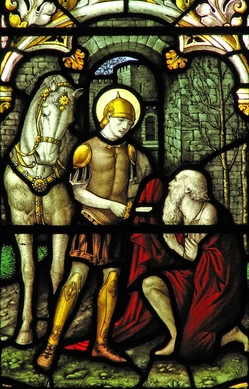
A Jew came into the office of The Catholic Worker the other day and sat around and read for a while. He nosed through Cahill's Christian State and condemned it for its anti-Semitism. Then he looked at a missal for a while and hummed through some of the Gregorian plain chant.
"I cannot," he said, "be a Communist because I believe in God." And he said it sadly because he believed that the Communists were nearer to social justice in their efforts to bring about a proletarian state than were the believers in God.
When he left he took with him the apocryphal books of the Old Testament and the autobiography of St. Teresa of
People have been calling the office of The Catholic Worker and asking us if we had anything to do with the street meetings which were going on over at Long Island Station in
There were three Catholics speaking over in Brooklyn and by appealing to the baser instincts in their audience they were getting a huge crowd, a cheering crowd, which stood around for three hours listening to speakers who pointed out how red-blooded and 100 percent American they were, how filled with intestinal integrity, and how some scum parasites of Europe had come over here and taken over the country. The great danger was the Jew. All evils came from the Jew. Jewish materialism was the cause of all our ills. It was the Jew who brought about the revolution in
We have consistently tried to avoid discussion of European questions in the paper we are getting out. We feel that we can't take up the subject of
I repeat, we the editors of The Catholic Worker had decided not to venture on world affairs. But when Catholics get up on
We believe that Hitler owes his success to the fact that it is easier to arouse a people against something concrete like a race than against an idea. It is not just the idea of materialism that the German people are fighting. They have made the Jew as a race the scapegoat. They have fastened on it the ills of present-day society. They have blamed Jews for defeat during the war, for the inflation after the war, for the present ills of the capitalist system. And even though individuals of the race, even though large masses of the race are guilty of the sins with which they are charged, the animus aroused against them is singular in that it is not an animus against the evils attendant on their actions, but against the Jews themselves.
To criticize the Jews for the protest which Jews have organized in this country and to say, as I heard them say at Long Island Station, "Are the Jews a sacred race that this enormous protest should have been organized?" is to be manifestly unfair. If no protests were organized on account of the persecution in
Another thing, horrible as the persecution of the Catholics is, it is not a persecution of a race or people. It is all Catholics, of whatever nationality, that are having to put up a struggle for a position. The Times tried to point this out when they said that in
For Catholics--or for anyone--to stand up in the public squares and center their hatred against Jews is to sidestep the issue before the public today. It is easier to fight the Jew than it is to fight for social justice--that is what it comes down to. One can be sure of applause. One can find a bright glow of superiority very warming on a cold night. If those same men were to fight for Catholic principles of social justice they would be shied away from by Catholics as radicals; they would be heckled by Communists as authors of confusion; they would be hurt by the uncomprehending indifference of the mass of people.
God made us all. We are all members or potential members of the mystical body of Christ. We don't want to extirpate people; we want to go after ideas. As
In addition to getting out a paper, the editors of The Catholic Worker are engaging in a fight against the Unemployed Councils of the Communist Party. To combat them they are doing the same thing the Communists are doing, helping the unemployed to get relief, clothing, food and shelter. But we are cooperating with the Home Relief instead of obstructing them. Two or three times a week we have eviction cases. When a desperate man or woman comes in asking for help, we have to call the Home Relief to find out about getting a rent check. Then we have to find a landlord who will accept the voucher. Usually they won't. There is only one landlord in our entire block who will take them. Over on Avenue B there is an Irish landlord willing to cooperate. On
After we have found an apartment, we have to commandeer a truck and men to do the moving. The sixteen-year-old boys in our neighborhood have been most helpful. Then there are always unemployed men coming into the office who are eager to help.
The other day we had a German Protestant livery stable man, giving us the use of a horse and wagon to move a Jewish family, and five Catholic unemployed men assisting their brother the Jew in getting transferred.
It is a situation which typifies the point I wish to make, that we are all creatures of God and members or potential members of the Mystical Body. This is something which those Catholics who bait the Jews lose sight of.
Servant of God Dorothy Day (1897-1980) was the cofounder with Peter Maurin of the Catholic Worker movement in 1933. Charles Gallagher, S.J., a visiting fellow at the Geneva School of Diplomacy and International Relations, found in the correspondence file in the Dorothy Day-Catholic Worker Collection at Marquette University this previously unpublished, unknown text. The text was published in
The cause of the apoplexy was the Archbishop's imputation of bigotry to the newspaper. His charge was not self-indulgent whining. He did not have to go back farther than a couple of weeks for examples. First, in reporting widespread child abuse in Brooklyn's community of Orthodox Jews, there was not the "selective outrage" which animates The New York Times against criminous Catholic clerics, whose numbers are in fact proportionally much smaller than other religious and professional groups.
Then there was the sensational front-page publicity of a paternity suit involving a Franciscan friar, going back twenty-five years, and getting more space than the war in Afghanistan and genocide in Sudan. Headlines also claimed that the Pope was seeking to "lure" Anglicans into his fold, when in fact he was responding to a petition. Then a columnist invoked the Inquisition, portrayed the theology of priesthood as neurotic sexism, and even mocked the Pope's haberdashery. The Archbishop said that her prejudice, "while maybe appropriate for the Know-Nothing newspaper of the 1850's, the Menace, has no place in a major publication today." While a free press is free to criticize, said the Archbishop, such criticism should be "fair, rational, and accurate."
Hostility raised to such a pitch that journalistic standards are abandoned, is provoked by an awareness that the Catholic Church continues to be the substantial voice for classical moral standards and supernatural confidence amid the noise of a disintegrating behaviorist culture. A tabloid is still a tabloid even if its editors dress in tweeds. Churchill said, "No folly is more costly than the folly of intolerant idealism." Not to worry. Christ promised that the gates of Hell will not prevail against his Church. He did not include The New York Times, 30% of whose work force has been laid off in the last year and a half.
Fr. Rutler's Weekly Column as Pastor of the Church of Our Savior in New York City. This is from the November 8, 2009 bulletin
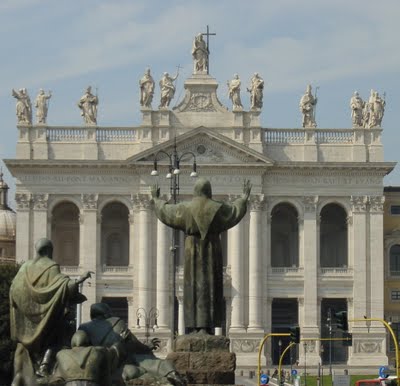 O God, who out of living and chosen stones builds up an everlasting dwelling-place for Thy majesty: help Thy people, who humbly pray to Thee, and whatever material room Thy Church may set apart for Thy worship, let it bring also spiritual increase.
O God, who out of living and chosen stones builds up an everlasting dwelling-place for Thy majesty: help Thy people, who humbly pray to Thee, and whatever material room Thy Church may set apart for Thy worship, let it bring also spiritual increase.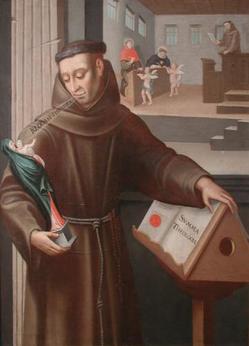 The second reading in the Office of Readings from today's liturgical memorial [even though it is Sunday in 2009 and Sunday takes precedence over saints' memorials] of Blessed John Duns Scotus bears posting here. What appears to be vague really is dead-on in thinking about charity and justice. Emphasis mine.
The second reading in the Office of Readings from today's liturgical memorial [even though it is Sunday in 2009 and Sunday takes precedence over saints' memorials] of Blessed John Duns Scotus bears posting here. What appears to be vague really is dead-on in thinking about charity and justice. Emphasis mine.
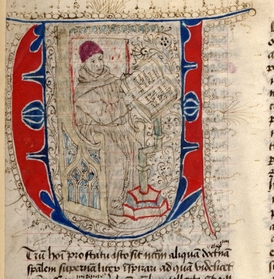 The learned will shine like the brilliance of the firmament, and those who train many in the way of justice will sparkle like the stars for all eternity.
The learned will shine like the brilliance of the firmament, and those who train many in the way of justice will sparkle like the stars for all eternity. 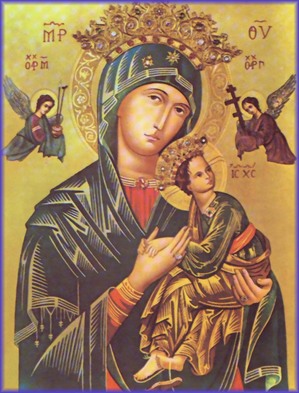 In danger, in distress, in uncertainty, think of Mary, call upon Mary. She never leaves your lips, she never departs from your heart; and so that you may obtain the help of her prayers, never forget the example of her life. If you follow her, you cannot falter; if you pray to her, you cannot despair; if you think of her, you cannot err. If she sustains you, you will not stumble; if she protects you, you have nothing to fear; if she guides you, you will flag; if she is favorable to you, you will attain your goal....
In danger, in distress, in uncertainty, think of Mary, call upon Mary. She never leaves your lips, she never departs from your heart; and so that you may obtain the help of her prayers, never forget the example of her life. If you follow her, you cannot falter; if you pray to her, you cannot despair; if you think of her, you cannot err. If she sustains you, you will not stumble; if she protects you, you have nothing to fear; if she guides you, you will flag; if she is favorable to you, you will attain your goal....
(Saint Bernard of Clairvaux, Hom. II super Missus est, 17: PL 183, 70-71.)
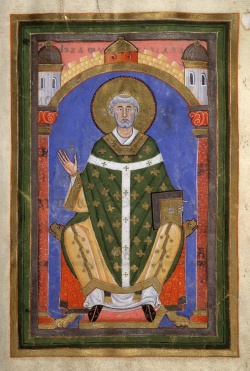 A tradition on the day which the liturgical memorial of Saint Willibrord is celebrated is the blessing of water. As we know, Catholics use the natural world to "hook" on to the supernatural world. That is, the Incarnation of the Word came into human history to hallow creation and for the redemption of the world. The Church sensing this, has organically developed blessings of things and people to lead us into the deeper reality of our faith looking toward salvation. The opening prayer for the Mass of Saint Willibrord may be found here, and ritual for the blessing of water follows.
A tradition on the day which the liturgical memorial of Saint Willibrord is celebrated is the blessing of water. As we know, Catholics use the natural world to "hook" on to the supernatural world. That is, the Incarnation of the Word came into human history to hallow creation and for the redemption of the world. The Church sensing this, has organically developed blessings of things and people to lead us into the deeper reality of our faith looking toward salvation. The opening prayer for the Mass of Saint Willibrord may be found here, and ritual for the blessing of water follows.
Saint Willibrord (d. 738) freed a home haunted by an evil spirit through the use of water blessed by him.
V. Our help is in the name of the Lord.
R. Who made heaven and earth.
Thou creature water, I purge thee of evil by the living + God, by the holy + God, that thou mayest become a saving remedy for body and soul, through Him Who shall come to judge the living and the dead and the world by fire. Amen.
Let us pray.
Bless, + O Lord, this water as a remedy for repulsing the foe of mankind, and send down on it they Holy Spirit, so empowered by heaven it may drive out both sickness and the worst enemy of all, and be a source of health to all who drink thereof. Through Christ our Lord. Amen.
Let us pray.
O Lord Almighty! Bless + this water which thou has granted for mankind's use in washing away all guilt of sin, so that, through invoking upon it thy holy name, it may prove an unfailing and divine remedy whatever it is sprinkled or used for drink. Let this water serve to wash away every impurity, and to bestow by thy beneficence health of body and soul upon all who use it, through Him Who shall come to judge the living and the dead and world of fire. Amen.
Let us pray.
O Lord, the Father Almighty! Bless + this creature of water that it become a saving means for humankind in removing all evil of body and soul and in expelling all harmful influence of the enemy. And grant that, through invoking thy holy name, we may possess in it a safeguard for our corporal and spiritual well-being. Through Christ our Lord. Amen.
Let us pray.
O God, Who has appointed illustrious promoters of the true faith for the various nations; grant, we beseech thee, that all who come seeking the intercession of our holy teacher, Saint Willibrord, may experience the joy of good health here on earth and prosperity and the glory of beatitude in the life to come. Through our Lord, Jesus Christ, thy Son, Who liveth and reigneth with thee in the unity of the Holy Spirit, God, forevermore. Amen.
May the blessing of almighty God, Father, Son + and Holy Spirit come upon this water and remain for all time. Amen.
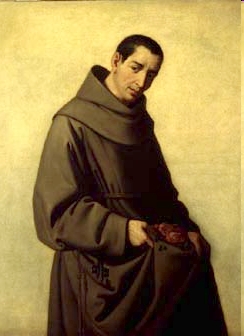 He humbled himself in all things and found favor with God. Great is the power of God; he is glorified by the humble.
He humbled himself in all things and found favor with God. Great is the power of God; he is glorified by the humble.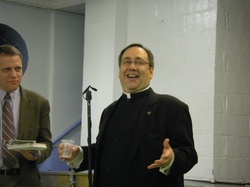 Meeting "blog personalities" is always fun, especially meeting a popular blogging priest. Father John Zuhlsdorf writes the blog, What Does The Really Say? He's an affable priest with a good sense of humor and a good thinker. He celebrated a Solemn Requiem Mass in the Extraordinary Form for First Friday at the beautiful Church of the Guardian Angels (NYC). The particular intention for the Mass was for deceased priests.
Meeting "blog personalities" is always fun, especially meeting a popular blogging priest. Father John Zuhlsdorf writes the blog, What Does The Really Say? He's an affable priest with a good sense of humor and a good thinker. He celebrated a Solemn Requiem Mass in the Extraordinary Form for First Friday at the beautiful Church of the Guardian Angels (NYC). The particular intention for the Mass was for deceased priests.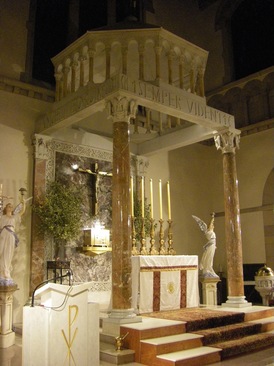
Almighty and merciful God, you filled the hearts of the peoples of the Orient with the knowledge of your only-begotten Son through the preaching of your holy martyrs, Ignatius, Francis, Alphonsus and their companions. Through their prayers may you now confirm those same peoples in the faith.
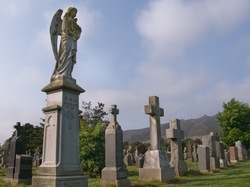
... while we visit cemeteries, let us remember that there, in the tombs, only the mortal remains of our loved ones rest, while awaiting the final resurrection. Their souls -- as Scripture says -- already "are in the hand of God" (Wisdom 3:1). Hence, the most appropriate and effective way to honor them is to pray for them, offering acts of faith, hope and charity. In union with the Eucharistic sacrifice, we can intercede for their eternal salvation, and experience the most profound communion while awaiting to be reunited again, to enjoy forever the love that created us and redeemed us.
... how beautiful and consoling is the communion of saints! It is a reality that infuses a different dimension to our whole life. We are never alone! We form part of a spiritual "company" in which profound solidarity reigns: the good of each one is for the benefit of all and, vice versa, the common happiness is radiated in each one. It is a mystery that, in a certain measure, we can already experience in this world, in the family, in friendship, especially in the spiritual community of the Church. May Mary Most Holy help us to walk swiftly on the way of sanctity and show herself a Mother of mercy for the souls of the deceased. (Pope Benedict XVI, Angelus Address, November 2, 2009)
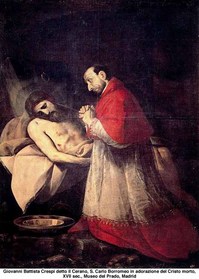 1. O loving and sustaining Lord,
1. O loving and sustaining Lord, A joyful song your people raise
On this, our patron's festive day
And sing your love in thankful praise.
2. A bishop faithful to your word,
A pastor loving to the sheep,
Charles preached the Gospel truth to all,
And strove th'Apostles' faith to keep.
3. A lover of the Cath'lic faith,
He worked to build within his see
A knowledge and a love of God
That all in Christ be fully free.
4. His tireless striving for the poor
Was modeled on the Christ, his Lord;
He taught the doubter and the lost
And brought the beggar to his board.
5. All glory, Lord, to you we sing,
And thanks for Charles your bishop bring,
As we the Father now adore
And Holy Spirit, evermore.
J. Michael Thompson
Copyright © 2009, World Library Publications
LM
PUER NOBIS, WINCHESTER NEW
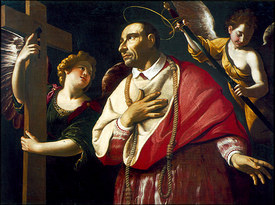 The Lord led the just in right paths. And showed him the kingdom of God.
The Lord led the just in right paths. And showed him the kingdom of God.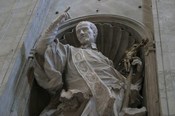 O glorious Saint Vincent
de Paul, the mention of your name suggests a litany of your virtues: humility,
zeal, mercy, and self-sacrifice. It also recalls your many foundations:
Works of Charity, Congregations, and Societies.
O glorious Saint Vincent
de Paul, the mention of your name suggests a litany of your virtues: humility,
zeal, mercy, and self-sacrifice. It also recalls your many foundations:
Works of Charity, Congregations, and Societies.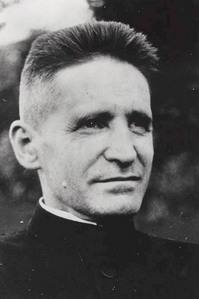
O God, You made Your priest Blessed Rupert a steadfast confessor of the faith and a servant of the poor. Through his intercession, raise up in Your Church fearless heralds of the Gospel and give us all a heart open to the needs of others.
More on the life of Blessed Rupert
The expression "a living saint" can be misleading. Certainly, we have encountered people in our own lives who fit that description, as best as we can judge. The Holy Church makes the final decision about saints. We celebrate them especially on All Saints' Day, and on All Souls' Day, we pray for our loved ones who are drawing more closely into the aura of holiness. The saints on the calendar are only the tip of the iceberg, and most of the saints who have ever existed are known to God alone. Perhaps churches should have a shrine to "The Unknown Saint" quite as we have a Tomb of the Unknown Soldier. All Saints' Day is rather like that.
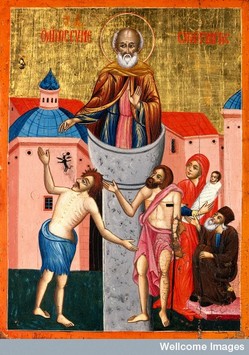 My point, though, is that there is no such thing as a dead saint.There are saints alive now, and there are saints who have physically died, but all are alive in Christ and they are "busy" in heaven, to use a temporal metaphor. Some saints capture the popular imagination more in one generation than in another. For instance, St. Simon Stylites was admired in Syria in the fifth century for spending most of his life seated on top of a pillar. That is not a useful model for our day, although some may still remember Flagpole Kelly, and not long ago thousands of New Yorkers went to watch a man spend a week on top of a column up the street in Bryant Park.
My point, though, is that there is no such thing as a dead saint.There are saints alive now, and there are saints who have physically died, but all are alive in Christ and they are "busy" in heaven, to use a temporal metaphor. Some saints capture the popular imagination more in one generation than in another. For instance, St. Simon Stylites was admired in Syria in the fifth century for spending most of his life seated on top of a pillar. That is not a useful model for our day, although some may still remember Flagpole Kelly, and not long ago thousands of New Yorkers went to watch a man spend a week on top of a column up the street in Bryant Park.
Millions are drawn to Padre Pio, and some are compelled by an unmeasured fascination with his miraculous spiritual gifts, which were blessings indeed, rather than emulating his heroic humility and discipline. There remains an astonishing cult of St. Thérèse of Lisieux. She was almost the reverse of St. Pio: totally 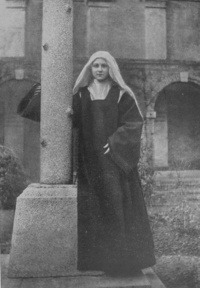 unknown in her earthly lifetime, and accomplishing nothing conspicuous to her contemporaries. She would have remained such had not her spiritual writings been discovered and published. Perhaps she fascinates precisely because in just barely 24 years on earth, she did the most ordinary things with most extraordinary joy. Whenever her relics are taken on pilgrimage to foreign lands (not to mention the one that was taken on a space shuttle), hundreds of thousands pour out to pray by them. This happened most recently in England, where the media were confounded by the huge crowds.
unknown in her earthly lifetime, and accomplishing nothing conspicuous to her contemporaries. She would have remained such had not her spiritual writings been discovered and published. Perhaps she fascinates precisely because in just barely 24 years on earth, she did the most ordinary things with most extraordinary joy. Whenever her relics are taken on pilgrimage to foreign lands (not to mention the one that was taken on a space shuttle), hundreds of thousands pour out to pray by them. This happened most recently in England, where the media were confounded by the huge crowds.
Concurrent with that phenomenon, there were astonishing developments in long-moribund Christian life there, not least of which was the announcement of the first papal state visit to Britain and the expected beatification of John Henry Newman, who predicted a "Second Spring" of Faith in England. Then came news of an Apostolic Constitution, which will provide a unique canonical structure to welcome those desiring union with the Catholic Church. Pope Benedict XVI, who well deserves the title "The Pope of Unity," has shown the power of the intercessions of the saints.
Rev'd Fr. George Rutler
Church of Our Saviour, NYC
November 1, 2009
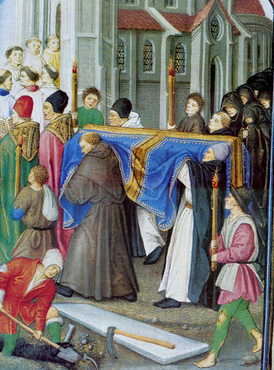 Eternal rest grant unto them, O Lord, and let the radiance of your light shine forever upon them (cf. 2 Es 2:35).
Eternal rest grant unto them, O Lord, and let the radiance of your light shine forever upon them (cf. 2 Es 2:35).
V. To you our praise is due in Zion,
O God.
R. To you we pay our vows, you who hear our prayer; to you all flesh will come (Ps 64:2-3).
Requirements for Obtaining a Plenary Indulgence on All Souls Day (November 2 )
- Piously visit a church to pray for the faithful departed
- Say one "Our Father" and the "Creed" in the visit to the church
- Say one "Our Father" and one "Hail Mary" for the intentions of the Pope
- Worthily receive Holy Communion (ideally on the same day)
- Make a Sacramental Confession within a week of (before or after) All Souls Day
- that one be free from all attachment to sin, even venial sin.
Requirements for Obtaining a Plenary Indulgence from November 1 to 8
- Devoutly visit a cemetery and pray for the dead.
- Say one "Our Father" and one "Hail Mary" for the intentions of the Pope
- Worthily receive Holy Communion (ideally on the same day)
- Make a Sacramental Confession within a week of (before or after) All Souls Day
- that one be free from all attachment to sin, even venial sin.
The "technical" things on Indulgences (so that we don't fall into error)...from the Handbook of Indulgences, Norms:
"1. An indulgence is the remission in the eyes of God of the temporal punishment due to sins whose culpable element has already been taken away. The Christian faithful who are rightly disposed and observe the definite, prescribed conditions gain this remission through the effective assistance of the Church, which, as the minister of redemption, authoritatively distributes and applies the treasury of the expiatory works of Christ and the Saints."
"22. The prescribed work for gaining a plenary indulgence attached to a church or oratory is a devout visit there, which includes the recitation of the Lord's Prayer and the Creed (Pater Noster and Credo), unless otherwise stated in a specific grant."
"23. 1. Besides the exclusion of all attachment to sin, even venial sin, the requirements for gaining a Plenary Indulgence are the performance of the indulgenced work and fulfillment of three conditions: Sacramental Confession, Eucharistic Communion, and prayer for the Pope's intentions.
2. Several Plenary Indulgences may be gained on the basis of a single Sacramental Confession; only one may be gained, however, on the basis of a single Eucharistic Communion and prayer for the Pope's intentions.
3. The three conditions may be carried out several days preceding or following performance of the prescribed work. But it is more fitting that the Communion and the prayer for the Pope's intentions take place on the day the work is performed.
4. If a person is not fully disposed or if the prescribed work and the three mentioned conditions are not fulfilled, the Indulgence will only be partial ..."
5. The condition requiring prayer for the Pope's intentions is satisfied by reciting once the Our Father and Hail Mary for his intentions (Pater Noster and Ave Maria); nevertheless all the faithful have the option of reciting any other prayer suited to their own piety and devotion."
From the Handbook of Indulgences, Grants
67. Visiting a Church or an Oratory on All Souls Day
A Plenary Indulgence, which is applicable only to the Souls in Purgatory is granted to the Christian faithful who devoutly visit a church or an oratory on (November 2nd,) All Souls Day.
13. Visiting a cemetery
An indulgence is granted the Christian faithful who devoutly visit a cemetery and pray, if only mentally, for the dead, This indulgence is applicable only to the souls in purgatory. This indulgence is a plenary one from November 1 through November 8 and can be granted on each one of these days. On the other days of the year this indulgence is a partial one.
